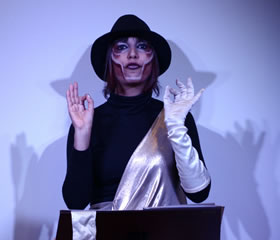 Abertura. Barbara Riethe (A voz do inconsciente), Teatro Livraria da Vila, SP,2012.
Abertura. Barbara Riethe (A voz do inconsciente), Teatro Livraria da Vila, SP,2012.Foto: Maria Julia Bertazzi
excerpt
Loving is as vital as breathing. Romeo: “Call me ‘my love’ and I will be re-baptized.” Love rebirths you… rejuvenates. (Emphatically) Who doesn’t want fire, the flame? Who can criticize the next person because they wish to love and drink from the Fountain of Youth? (Mocking) “Criticize yourself.” Shut up. Loving is living.
synopsis
“The whole world is a stage,” said Shakespeare and Life Is a Stageis the title of Betty Milan’s play, adapted from her book Those Who Love Listen. The book contains the best columns from Milan’s Consultório Sentimental. Infidelity, jealousy, masochism, sexual prejudice. The author herself selected the columns best suited to dramatization and treated them as short scenes in which there is a consultee, a consultant and a character whose function is that of a chorus: THE VOICE. The play is for three actors. They all remain on stage from beginning to end, at a pulpit with the text, which is treated as a score. This means that the actors, like singers, will deliver the text to the audience with their voices.
history
The play was written for the Grupo Vozes, comprised of Barbara Riethe, Betty Milan, Fabio Carrilho and Miguel Prata, who met at the University of São Paulo during a workshop by guest director Jean Luc Paliès on his Brecht-inspired form of theatrical expression, Pulpit Version. It was performed in São Paulo at the Livraria Cultura in February 2012, at the Livraria da Vila (photos attachment 3. Credit to Maria Julia Bertazzi) in March and August of the same year, and at the literary festival Fliporto that November.
Acesse aqui o texto de A vida é um teatro.
opinion
I have heard wonderful things about the show written and directed by Milan. No one better than the writer to direct her own work, as Beckett used to. I’m dying to see it!
Zé Celso, 2012.
I loved the concept of her play: minimalist/maximalist.
Denise Stoclos, 2012.


